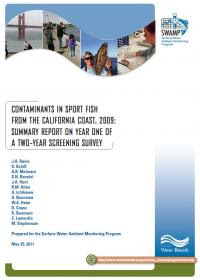Nineteen percent of the coastline sampled by the state water board harbored fish with mercury in such high concentrations that they shouldn’t be eaten by young women and children.
 |
| Source |
Tony Barboza
Los Angeles Times
Traces of mercury and PCBs are widespread in sport fish in California’s urban coastal waters, a survey released last week by the state water board found.
But 19% of the urban coastline sampled by researchers harbored fish with mercury in such high concentrations that they shouldn’t be eaten by young women and children. Fourteen percent of locations had similarly elevated levels of PCBs.
The findings, part of a two-year inquiry that is the largest statewide survey of contaminants in sport fish along the California coast, examined more than 2,000 fish from three dozen species gathered in 2009 from waters near Los Angeles, San Francisco and San Diego.
Researchers said the study highlights the health problem of lingering mercury, a poisonous metal that is found in fish globally, and of PCBs, toxic chemicals the United States banned in the 1970s. Both substances continue to pose a risk to people who eat fish caught along the California coast because they can lead to nervous system damage and developmental problems in children and can cause cancer, liver damage and reproductive harm.


Be the first to comment on "Mercury, PCBs widespread in sport fish along California’s urban coastline, survey finds"